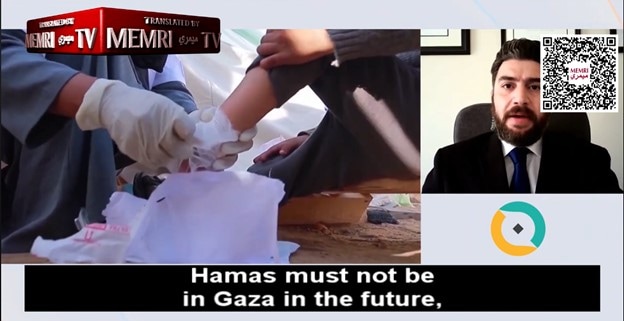
Hazem Alghabra, former State Department advisor, speaking from Washington D.C., clashed with BBC TV host Mohamed Abdul Hamid over American suspension of UNRWA funding on a January 30, 2024 show on BBC Arabic (U.K.). He said that 12 UNRWA employees were involved in the October 7 attacks against Israel and that UNRWA centers and schools are used to store weapons and rockets, some of which were even launched at Israel from within them. Alghabra went on to say that Hamas uses UNRWA to provide food, schooling, and salaries to the people of Gaza so it can focus on digging tunnels and manufacture weapons. He said that Hamas has gone so far as to say that it is not responsible to provide the basic needs of the people of Gaza because it is under occupation (see MEMRITV clip no 10585).
Abdul Hamid responded that Hamas’s statement is correct and that the UN and UNRWA are not doing any favors to the people of Gaza by providing aid to them, it is their duty to do so under international law. Alghabra said that Hamas cannot be part of Gaza's future and that the people of Gaza must spew them out. To this Abudl Hamid replied that it is unfair that the civilians in Gaza are used to drive Hamas out of their leadership role in Gaza. Alghabra said that no country is obligated to support UNRWA, and they can choose to stop this support so UNRWA can reform itself and the Palestinians can make better decisions.
Hazem Alghabra: "There is a clear and essential problem with the UNRWA organization, and it warrants a solution. In fact, there are two problems. First of all, Guterres himself admitted that at least 12 individuals, who are regular UNRWA employees, participated in the October 7 attack. This is inconceivable. In addition, the UNRWA centers and schools are used to store and even launch rockets at Israel, and there is terrible evidence of that."
Mohamed Abdul Hamid: "But the first part of what you said is still unverified. Twelve individuals are "accused" of that. No clear evidence was released..."
Alghabra: "No. The Secretary-General of the United Nations has admitted that."
Abdul Hamid: "Even if it is proven that they were involved [in the attack], we are talking about 13,000 UNRWA employees in the Gaza Strip. Why punish the entire Gaza Strip for the actions of twelve individuals?"
Alghabra: "It is not that those 12 individuals embezzled a fistful of dollars. They perpetrated terrorist attacks."
Abdul Hamid: "But still..."
Alghabra: "This is very complex. But there is another important part to what I say. Hamas uses UNRWA to carry the burden and ease the pressure on its government...Hamas considers itself to be the government in Gaza. [UNRWA] distributes food, pays monthly salaries, runs schools, while Hamas is busy digging tunnels and producing and storing weapons. This is another aspect of the problem with UNRWA. It carries the burden...These are not my words or the words of Israel. Hamas itself says so. Since the first days of the war. Hamas said: 'We are under occupation, and it is not our responsibility to provide for the needs of the people. Our business is resistance.'"



Abdul Hamid: "This is true. If the Gaza Strip is under occupation, it is not the responsibility of the occupied [authority] to provide for the [people's] basic needs. With all due respect, the UN and UNRWA do not provide aid to these people as a favor. This is a humane duty and an obligation according to the international law and norms. So again, when we cut off the aid and the funding, we are punishing people who are besieged, under extremely bitter war conditions, just because there are 12 individuals who have only been "accused" of involvement in some attacks."
Alghabra: "Sir, this is more simple than you imagine. The Palestinians in Gaza should spew Hamas out, which uses its weapons to force the people...Perhaps the Israeli guns were turned against the Palestinians in a horrible manner in the past few months, but the guns of Hamas are always pointed at anyone who dares speak against Hamas. Things are very clear. Hamas must not be in Gaza in the future, and things will go back to normal and even better than normal."



Abdul Hamid: "Excuse me, but what you are saying is extremely dangerous. It means deliberately using the chip of human suffering to force the ordinary Gaza civilians to make a certain decision, or to participate in eliminating the Hamas movement. This is a kind of collective punishment, and an abuse of the humanitarian aid chip, which is rejected by international law, by the way."
Alghabra: "You can look at it whichever way you want, but the perspective of the United States and the international community, in general, is that Hamas constitutes a terrorist organization..."
Abdul Hamid: "Regardless of that...I am not arguing with you about this. My argument is that the attempt to get rid of Hamas leads to measures by the U.S. and others, which constitute punishment of the civilians. As simple as that. This is done in order to force them to take part in getting rid of Hamas, and this is illegal."
Alghabra: "Sir, this is not a punishment. No country is obliged to support UNRWA and give it money. Countries choose to do so, and when they decide to stop their support so that UNRWA can reform itself, and so that the Palestinian people can make better decisions – they have the right to do so."













